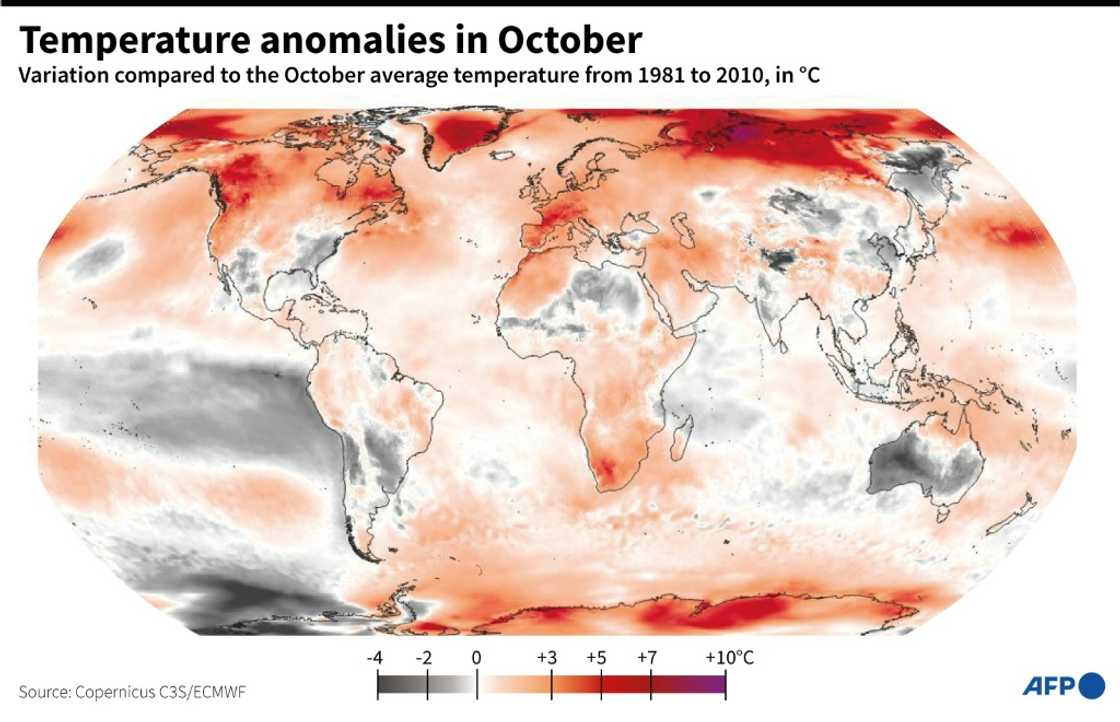Fixing climate trumps economic woes, threat of war: YouGov survey

Source: AFP
PAY ATTENTION: Сheck out news that is picked exactly for YOU ➡️ find “Recommended for you” block on the home page and enjoy!
Government action to curb global warming should be a top concern despite inflation, an energy crisis and nuclear sabre-rattling by Russia, according to a YouGov survey in wealthy nations published exclusively by AFP.
Carried out before the COP27 climate summit in Sharm el-Sheikh, Egypt, the survey found that more than half of respondents in France, Britain, Italy, Spain, Germany and the United States said halting global warming should be a "key priority" regardless of the state of the economy.
Thirty percent said it should be "paused" so other problems can be addressed.
"This survey shows that there is far more common ground among the public when it comes to climate change and what to do about it, than what we often see on our TV screens and Twitter feeds," said Luke Tryl, British director for More in Common, a non-profit examining polarisation in society.
But the survey also revealed differences in outlook between the six nations, which could suggest people in rich economies hit hardest by climate impacts see the issue as more urgent, compared to wealthy countries less afflicted.
More than 60 percent of respondents in France, Spain and Italy said tackling global warming should not give way to other problems, but barely 40 percent held this view in Germany, Britain and the United States.
PAY ATTENTION: Enjoy reading our stories? Join YEN.com.gh's Telegram channel for more!
'Lack of confidence' in politicians

Source: AFP
Germany and Britain have seen episodes of flooding and extreme heat, but the Mediterranean Basin -- a climate change "hotspot" according to the UN's IPCC climate science advisory body -- has been hammered by heatwaves, droughts and wildfires, all of which are predicted to worsen.
Two to three times as many respondents in each country said that climate change will cause "a large amount" of harm to the world in the future, compared to whether they personally will experience harm.
That possibly reflects the extent to which people in rich countries are insulated from severe impacts.
When respondents were asked whether they had already personally experienced weather events caused by climate change, 48 to 58 percent in Spain, Italy and France said they had, compared to 44, 38 and 36 percent in Britain, the United States and Germany, respectively.
The United States was in several ways an outlier in the survey, which polled between 1,000 and 2,000 people in each country.
Despite a crescendo of extreme weather measurably linked to warming in the United States -- including intense drought in the southwest, record wildfires in the northwest, flooding and drought in the midwest, and devastating hurricanes on the eastern seaboard -- barely half of Americans think that human activity has caused Earth's climate to change.
That figure rises to an average of nearly 80 percent across the European nations, and to 84 and 88 percent, respectively, in Spain and Italy.

Source: AFP
Views in the United States on this question were evenly divided across age, gender and self-identified race, but skewed heavily according to political affiliation.
More than 80 percent of those voting for President Joe Biden in 2020 said global warming is manmade, versus only a quarter of those who voted for Donald Trump, who this week announced he would take another run at the White House in 2024.
Across the board, people said political leaders were not doing enough to fix the climate, the survey showed.
"There is a shared lack of confidence in their national government's ability to grip this crisis," Tryl said.
Protecting future generations

Source: AFP
Nearly 40 percent of respondents said government policies to reduce carbon emissions would have a "positive impact" in the long term, with only 14 percent saying such policies would improve things in the short-run.
Some 90 percent of the total respondents said they believe the climate is changing, with the remainder saying is not, or they did not know.
When asked, however, if they were confident their governments were "prepared to take the necessary action to stop climate change," two-thirds of respondents who do believe the climate is changing said "no" in European countries. In the United States it was 40 percent.
"Politicians aren't necessarily keeping up," said Amiera Sawas, director of programmes and research at Climate Outreach in Britain, who works with survey data.
By a wide margin, the number one reason given for taking action on climate change was to protect future generations, with between 40 and 50 percent giving that as a motive.
Protecting habitats and species from further damage was the second most common answer.
Following on the heels of COP27, a UN biodiversity summit tasked with laying down new targets for protecting nature will convene in Canada in early December.
New feature: Сheck out news that is picked for YOU ➡️ find “Recommended for you” block on the home page and enjoy!
Source: AFP





